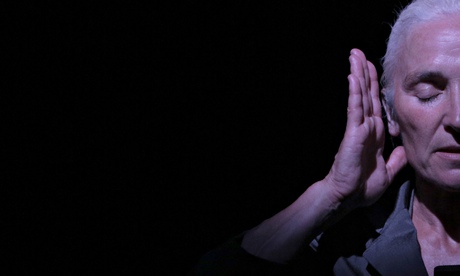
Olwen Fouéré's microphone stand is a thing of sculptural beauty. Sinuous and strange, it leans to the right like a tree bending over a river; impeccably lit by Stephen Dodd, the shadow it casts continues the ribbon line that twists across the stage, like a river seen from above. Fouéré's voice has a sculptural beauty, too: it is hard, guttural, atonal, carving out language where others might sing. When she stops speaking and breathes into the microphone, it's like standing at the shore being buffeted by the wind.
This scintillating prose-poem isn't so much an adaptation of James Joyce's Finnegans Wake as an hour spent fishing within it. Fouéré pulls up line after line of intricate phrases, whole nets crammed with broken syllables and hybrid words, and sometimes nothing whatsoever. What she conveys isn't just – as her subtitle summarises it – "the voice of the river" within the latter section of the novel, but also the flotsam and jetsam of life along its banks, the mythical characters born of the land and the "real" people who will be buried within it. As an audience member, you drift along Riverrun's current, hoping not to drown.
It's a challenging piece, but how could a work based on Joyce's final novel, the apotheosis of cerebral stream-of-consciousness linguistic experiment, not be challenging? Meaning is obfuscated, narrative elusive – but you listen for something else, something more elemental. Language here is slippery, fluid, but also obdurate: at once the flowing river dissolving into the sea and the rock beside and beneath. Fouéré uses her whole body to shape it, visibly softening when the final word is spoken. Her performance is as single-minded as Joyce's, an inexorable rush of thought and idea, full of mystery and marvel.
• Olwen Fouéré's riverrun: the watery voice of Joyce's Finnegans Wake
• Did you catch this show – or any other recently? Tell us about it using #gdnreview

